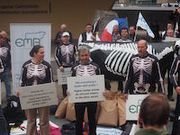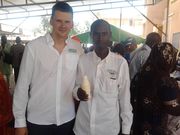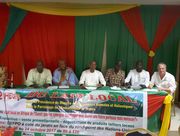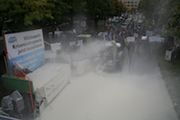EMB Newsletter November 2017
Newsletter as PDF
Contact
EMB - European Milk Board asbl
Rue de la Loi 155
B-1040 Bruxelles
Phone: +32 - 2808 - 1935
Fax: +32 - 2808 - 8265
Dear dairy farmers and interested parties,

The question of what path we should be taking has been taxing dairy farmers for a long time.
Butter prices are higher than ever and butter is in short supply; and then, on the other hand, there are vast quantities of milk powder in the public intervention stocks that nobody wants. Despite high butter prices, income from milk sales in 2017 is still not meeting production costs.
Milk production is increasing rapidly, and has risen by 16% over the past two months in the Flemish Region alone. The fat content of milk from the farms is also rising. How will this pan out? Dairies are already announcing falling milk prices for the end of the year.
What is the European Commission doing? What proposals are coming from the European Parliament and the Council of Ministers? Agriculture Commissioner Phil Hogan plans to avoid buying intervention powder “without good reason” and intends to cut intervention in 2018. There are no new crisis instruments. Hogan also does not want the voluntary production cuts, which have proven to be an effective measure in the EU reduction programme, to become a permanent instrument. However, the European Commission has not ruled out reintroducing production cuts in the event of unforeseen circumstances. In our opinion, a cap on production is necessary, but that is out of the question for the agricultural commissioner. Hogan will probably go down in history as the first EU Commissioner to make warehousing losses.
The members of the EMB Executive Committee have put the last few months to good use; we have organised actions to demonstrate the problem with skimmed milk powder stocks and have sought constructive discussion. Where will the path take us? The European dairy industry seems to be in a good position and the farmers’ associations continue to focus on increasing production. However, we milk producers are going through difficult times; our farms, the farmers and their families are facing an uncertain future.
There is only one way out for us: the EMB’s Market Responsibility Programme, which provides for cutbacks in milk production in times of crisis. We will continue to stand up for prices that cover costs, fair remuneration and the survival of our family businesses. If the situation requires, we are also ready to drive our tractors back into the capital of the EU. We made this clear to the President of the European Commission Jean-Claude Juncker and Agriculture Commissioner Phil Hogan at our last action on 26 October in Brussels.
Erwin Schöpges, EMB Executive Committee member and member of the Milk Producer Interest Group (MIG), Belgium
Stripped to the bone - higher butter prices do not end misery in the dairy sector!
Butter shortage: fact or fiction?
Fair milk for West Africa
Closing declaration of 72h of local milk
Powder-spraying action: closing rally outside the State Chancellery in Munich
Unfair trading practices: Consultation to improve the food supply chain
Impressum
European Milk Board asbl
Rue de la Loi 155
B-1040 Bruxelles
Phone: +32 2808 1935
Fax: +32 2808 8265
E-Mail: office@europeanmilkboard.org
Website: http://www.europeanmilkboard.org






